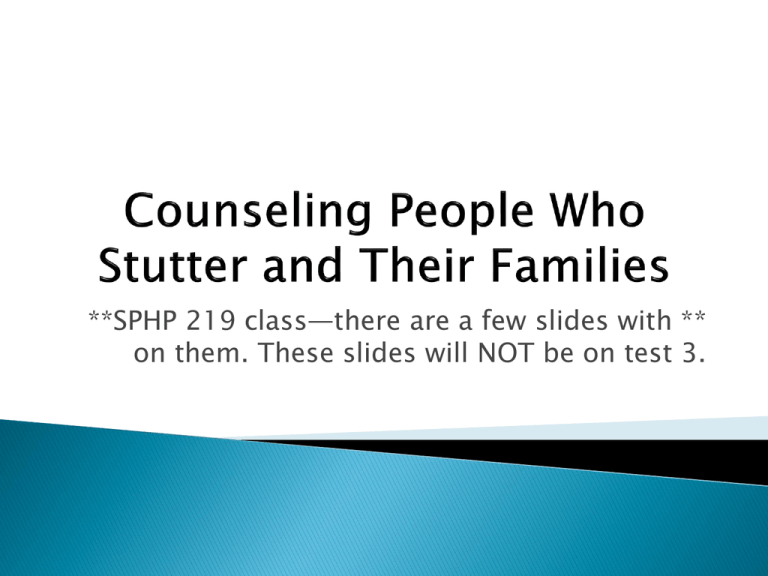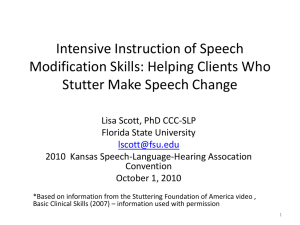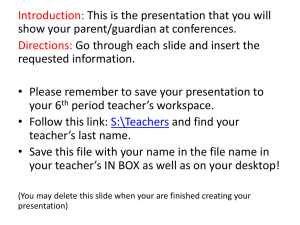Counseling People Who Stutter and Their Families
advertisement

**SPHP 219 class—there are a few slides with ** on them. These slides will NOT be on test 3. Basic Counseling Confidential Non Judgmental Active Listening Effective Feedback Culturally Sensitive Age of Client Education of Parents Family Values, Resources Effective treatment of families and PWS means addressing all aspects of stuttering Physical, Cognitive and Emotional Aspects of Stuttering. SLP job provide appropriate therapy Counsel you about the feelings that you experience Develop a framework for thinking about stuttering Develop practice exercises that fit your lifestyle and personality Develop a healthy attitude about stuttering Provide resources (NSA,SFA) sort through media hype conference with family, school, work Are you desensitized to stuttering? Your skill set is limited So is mine Be honest with yourself, your client and your supervisor about your strengths and needs Obtain support from mentors, CEU courses, outside agencies to craft a program that works Establish credibility with honest exchange of information I will provide treatment for you/your child as long as I feel you are receiving the best services. Like most SLP’s we rarely see PWS because only 5% of children and 1% of the adults stutter. Its very unusual for any SLP to have the opportunity to treat a large number of PWS. Establish your treatment goals and when/if you will refer out. Plan in the beginning for the transition to the next phase of growth. An outside referral may be for a limited time or may be a permanent transition. Sample wording for transition: I know you appreciate the services I have provided. As we discussed when we started working together my professional obligation is to refer you to others when needed. I have taken you as far as I can and your needs will be better served if I refer you to an expert who may support your goals. Counseling Be Honest about Stuttering Unless you are a PWS, admit you don’t know how it feels to stutter. Ask most PWS and they will tell you they get pretty upset when a therapist nods and says: Gee, I know how it feels. It’s okay, don’t be nervous. Don’t worry, when I’m nervous I stutter too. Acknowledge they are the experts regarding the experience of stuttering You might say: I can imagine how frustrating it might be. I don’t stutter can you share with me how it feels to stutter? If you were to share with your parents/spouse/employer what its like to stutter what would you tell them? Establish top three goals for the PWS Establish top three goals for associated support network. For PWS Establish the range of their stuttering symptoms. What happens most often? Provide chart with range of symptoms and samples. Use their language, terms and descriptions. For PWS Acknowledge the sadness, the grief, the lost opportunities and the effect on their life. Do they accept their stuttering? Do they feel its their fault? What do they feel before, during and after the moment of stuttering? For PWS Establish goals regarding advocating and advertising that they stutter. Be careful not to minimize their feelings. Create a positive goal for homework My wordinglet’s build from there That’s a good start For Spouse or Parent of PWS: Ask about origin, progression, what helped, what didn’t work, techniques, technology, behavioral cognitive strategies, community resources, groups, reading, videos, movies, intense programs, NSA, SFA, friends, support network, finances, coping skills, family history of stuttering, cluttering, learning issues, research, drugs, counseling, emotional concerns, Toastmasters. For a child who stutters review: Their strengths, activities they enjoy, do they know why they came to see you today, do they like the way they talk, show pictures of how they feel, have they been bullied or teased, do they know anyone else who stutters, what do they call their bumpy speech, use art, building, make books, play therapy, watch videos if child is ready. Don’t videotape or play back tapes of PWS unless they are ready. For SLP Do the clients goals reflect your needs or theirs? No guinea pigs Example: “I want to work on _____.” (you open the 1 st page of the therapy book you just purchased.) Instead build on past positive experience: “You mentioned you successfully used vowel prolongations in past therapy, let’s start using that with rote activities, then use vocabulary specific to your occupation.” Let me know if any task is too easy, it’s too difficult, or if it’s just a little challenging. For SLP Show client chart with numbers to establish common rating system. Ask client to provide feedback using numbers or colors. Assure client that while you work with them you will always model techniques first ,use techniques as a team and when they are ready they will practice technique alone. Wording: prefer that ______, ready for ______, in or out of comfort zone, ready to risk. When your with me, you’re safe, our discussions are confidential and you’re free to stutter. For SLP Do You Have Preconceived Ideas About PWS That Hinder Your Treatment Effectiveness? Examine Your Beliefs About PWS. Review Current Research Before and During the Treatment of PWS. For SLP-what to expect Which of the following statements is likely to be spoken by a PWS? I know what I want to say and wish others would just wait for me to finish talking. I feel like my head is going to explode if one more person tells me to slow down. What’s wrong with me-why can’t I control my stuttering? For SLP-what to expect Which of the following statements is likely to be said by an adult PWS? I wish that I had been treated for stuttering at an earlier age. I am frustrated with all the misinformation about stuttering. Most SLP’S know a lot about PWS. People with autism, aphasia and physical disabilities are treated and understood better than PWS. For SLP-what to expect The parent of a child who stutters usually: Is concerned that they caused their child’s stuttering. Wonders if they are doing anything to prolong stuttering. Feels guilty that they can’t help their child. Have tried their own solutions. For SLP-what to expect Parents often react differently to child that stutters based on their own Hx, mental health and coping skills Mom – May not help child due to Dad’s resistance Dad who stutters– May be resistant due to guilt, blame, shame “I gave this to my child.” For SLP-what to expect Discuss with parents What if you knew in advance that: your child would stutter? Have dyslexia? Win a gold medal? What have you learned from your child? For SLP-what to expect The parent of a child who stutters usually: Feels embarrassed and confused about what to do when someone comments about their child’s stuttering. Feels frustrated and confused about treatment-they consulted three SLP’s and all three provided conflicting advice. For SLP-what to expect The Parent of a child who stutters is comforted and served best when you: tell them the truth. provide concrete examples of stuttering. help them to recognize all aspects of stuttering. help them to respond to the comments of others. reassure them and strengthen their skills as their child’s stuttering fluctuates. provide the most current research, techniques and tools for the efficient management of stuttering. For PWS Explore their feelings about stuttering. Use therapy tools which explore their feelings. All feelings are okay. It’s what you do with the feelings that matter. For PWS How much pain has stuttering caused in their life? Do they feel it has altered their education, social life or choice of occupation? For PWS If you could change one thing about your experience with stuttering what would it be? What character traits have you developed as a result of stuttering? Explore their strengths. For PWS Things I like about myself. Things I would like to change. Increase PWS awareness of perceptions Are their perceptions accurate? Distorted thinking is common Complete these sentences: People think that kids/PWS are _____ My Teacher thinks kids who stutter are _____ My employer thinks PWS are _____ I think that PWS are _____ My Friends think that PWS are _____ Don’t ignore the negative, rather, channel into more productive statements. Channel negative energy into positive. Provide written, tactile and verbal resources for home assignments. As an SLP you have the power to impact the life of a PWS, their family and our society As an SLP you have tremendous power to influence PWS Students who stutter are still alone in an articulation group Articulation is addressed over stuttering Stuttering gets worse, the window is closed Articulation vs. Stuttering treatment PWS are more vulnerable because of low incidence Less money, less research, invisible disability, not great for TV or radio spots PWS & NSA** Group Attendance Nice to belong Place to practice Learn from others Help others/mentor Understand spouses experience Appreciated for true self not as PWS first PWS & NSA** No Group Attendance “Not joiner” Private person Not ready to admit they are part of “that group” Group Distance Resources are limited Embarrassed to be PWS Angry with SLP’s, MD’s Tired of talking about stuttering Summary Treatment needs to be about PWS goals Evidence based Timely Combined eclectic approach Not cookbook therapy Individual, group and real world Over learn skills to speak under stress You are critically important You have power Enhance PWS’ life by providing the best care Stuttering Resources ** FluencyCoach Free Software-AAF Online Metronome-Pacing SpeechEasy-FAF in or behind ear MySpeech-personal AAF device Friends – The National Association of Young People who Sutter National Stuttering Association (NSA) Roseville-Sacramento NSA Chapter Group Stutter Talk The Stuttering Home Page Toastmasters California Department of Vocational Rehabilitation











